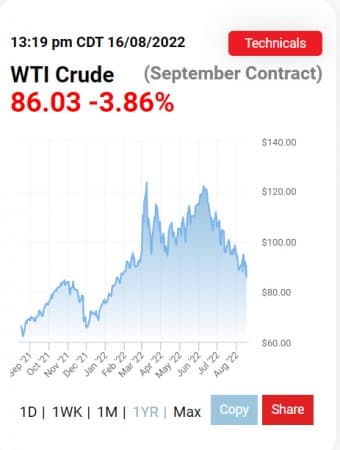Crude oil prices fell further on Tuesday, with WTI falling to its lowest benchmark price since January this year.
Crude oil prices began their fall on Monday, dragged down by China’s disappointing economic data that led to China’s central bank cutting lending rates.
WTI prices fell to $86.13 per barrel by 2:24 pm ET, down $3.28, or 3.67% on the day. Brent crude fell $2.98 (-3.13%) on the day to $92.12 per barrel—the lowest price since February this year.
Gasoline prices in the United States have been falling for months now led by falling crude oil prices. Today’s gasoline prices in the United States average $3.949 per gallon, according to AAA data, down from $3.956 yesterday. Over the last month, U.S. gasoline prices have fallen 60 cents. They are still 76 cents above where they were this time last year.
The weight of disappointing data out of China—the world’s second-largest oil consumer and largest oil importer—was compounded on Tuesday by developments surrounding the Iran nuclear deal. Just moments before the deadline, Iran sent its written response to the EU regarding the “final” nuclear deal text. In its letter, Iran suggested that it was closer than it had ever been to securing a deal, although there were a few sticking points—mainly that the U.S. guaranteed the deal couldn’t be changed by future U.S. Presidents.
Despite the current crude oil fundamentals that suggest the market is still tight, the market fear is that Iran could unleash on the market hundreds of thousands of barrels of crude oil per day if sanctions were to be lifted. Iran has said that it could ramp up production and exports within months.





